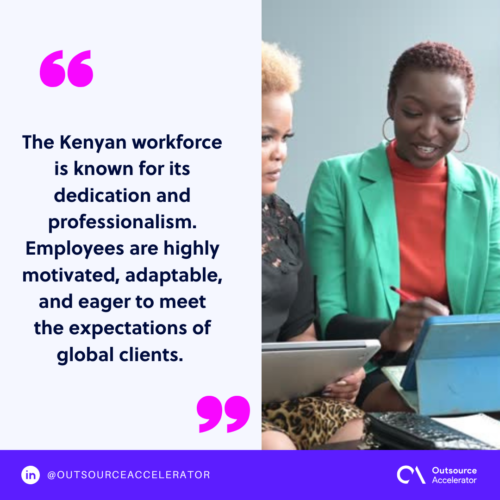The advantage of the Kenyan outsourcing workforce

Kenya is quietly but confidently stepping into the global outsourcing spotlight.
While traditionally overshadowed by giants like India and the Philippines, the Kenyan outsourcing workforce offers its own unique blend. The country brings untapped talent, affordability, and innovation that is rapidly capturing the attention of forward-thinking businesses.
Its talent pool isn’t just a source of labor. It’s a dynamic force powered by education, adaptability, and a deep understanding of global business needs.
As companies search for fresh, reliable outsourcing destinations, Kenya is proving to be not just an alternative, but a rising leader with strengths that are hard to ignore.
In the 519th episode of the Outsource Accelerator Podcast, John Mamboleo, the CEO of VIZX Global, explains what he believes are the strengths of the Kenyan outsourcing workforce.
The benefits of outsourcing
Outsourcing has become a strategic business practice for organizations looking to streamline operations, enhance efficiency, and focus on core competencies.
By delegating non-core functions to external service providers, companies can unlock numerous benefits, including:
- Cost savings – Outsourcing to countries like Kenya with a competitive cost structure can significantly reduce operational expenses without compromising on quality.
- Access to specialized skills – Leveraging the expertise of the Kenyan outsourcing workforce allows businesses to access specialized skills which may not be available in-house.
- Increased flexibility and scalability – Outsourcing provides businesses with the flexibility to scale operations up or down based on demand, without the need to invest in additional resources.
- Time efficiency – By outsourcing routine tasks to skilled professionals in Kenya, businesses can free up valuable time and resources that can be redirected towards core business activities and strategic initiatives.
- Global market reach – Partnering with outsourcing firms in Kenya can help businesses tap into new markets and expand their global footprint.
- Risk mitigation – Sharing responsibilities with outsourcing partners can help companies mitigate risks and ensure business continuity, especially in times of economic uncertainty or fluctuating market conditions.
John himself was led back to Kenya after questioning whether he could continue his staffing business in a place less costly than the US.
“The challenge was, ‘where could I do this more effectively, probably cheaper and more efficient?”
7 Strengths of the Kenyan outsourcing workforce
Unsure about what the Kenyan outsourcing workforce can bring to the table?
Here’s a list of some of the strengths that John highlights:
1. Skilled and educated workforce
Kenya’s education system produces a well-educated workforce proficient in diverse disciplines.
Universities and technical colleges are focused on equipping students with market-relevant skills, particularly in technology, healthcare, and business services. This ensures that Kenyan professionals can meet the demands of a global market.
For instance, IT outsourcing is a growing field in Kenya, with professionals skilled in software development, cybersecurity, and data management.

The country’s focus on STEM (Science, Technology, Engineering, and Mathematics) education has further enhanced its ability to provide specialized talent in these areas.
John also sees a strong talent pool for the customer service field in Kenya.
“Obviously number one is the call center. But very close to that is the tech workforce that is emerging. It’s been a great place [where] we’re finding a pool of workers that are ready to work.”
2. Cost-effective labor
One of the most compelling advantages of outsourcing to Kenya is its affordability. Compared to Western markets, businesses can access highly skilled talent for a fraction of the price.
Despite offering competitive pricing, the quality of work remains high, making Kenya a cost-effective alternative to traditional outsourcing destinations.
This affordability extends beyond wages to other operational costs, such as infrastructure and utilities, which are relatively lower in Kenya. Companies looking to optimize budgets without compromising service quality find Kenya an ideal outsourcing destination.
3. Multilingual proficiency
Kenya is a multilingual country, with English and Swahili as official languages. Additionally, many Kenyans are fluent in other international languages, including French and German.
John affirms this, noting, “Their English proficiency is high. I do believe in the latest ranking, Kenya was ranked as the second most proficient country in English in Africa.”
This multilingual capability makes Kenya a valuable asset for businesses targeting diverse markets.
The ability to provide customer support and other services in multiple languages enhances Kenya’s appeal for industries like tourism, e-commerce, and international trade.
It also allows companies to offer personalized experiences to their clients, thereby improving customer satisfaction and retention.
4. Strong work ethic and professionalism
The Kenyan workforce is known for its dedication and professionalism. Employees are highly motivated, adaptable, and eager to meet the expectations of global clients.
This strong work ethic translates to high levels of productivity and reliability, making Kenyan professionals valuable contributors to business success.
Moreover, Kenyans are culturally adaptable, which helps them work seamlessly with international teams. Their ability to understand and align with different cultural norms and business practices is a significant advantage in today’s interconnected world.

5. Growing technological ecosystem
Kenya’s tech scene, often referred to as “Silicon Savannah,” is flourishing. With increasing internet penetration and widespread use of mobile technology, the country is well-positioned to deliver tech-driven outsourcing solutions.
Nairobi, in particular, has become a hub for tech startups and innovation, attracting global attention.
This technological ecosystem supports industries such as software development, mobile app creation, and digital marketing.
Kenya’s tech-savvy professionals are not only familiar with the latest tools and platforms but are also quick to adapt to new technologies.
John points out that “it’s about the tech knowhow, and also the growth in the infrastructure which is about having reliable power supply, reliable internet, [which] is important for global business.”
6. Youthful and dynamic population
At a median age of about 20, Kenya’s population is primarily young. This youthful demographic is highly dynamic, tech-savvy, and eager to learn.
They bring energy and innovation to their work, making them ideal for industries that require creativity and forward-thinking solutions.
Additionally, Kenya’s youth are digitally literate, which is critical in delivering high-quality services in areas like customer support, data entry, and social media management.
Their enthusiasm and willingness to embrace new challenges make them a driving force in Kenya’s outsourcing industry.
7. Strategic geographic location
Kenya’s location in East Africa provides a strategic advantage for businesses operating across multiple continents. Its time zone allows for overlapping work hours with Europe, the Middle East, and parts of the United States.
This makes Kenya an attractive option for companies requiring real-time collaboration and support.
Furthermore, Kenya’s international airport and robust communication infrastructure make it a convenient hub for business travel and connectivity, enhancing its appeal as a global outsourcing destination.
Future potential of the Kenyan outsourcing workforce
Kenya’s outsourcing workforce is poised for significant growth in the coming years. The government’s continued investment in technology and education will further enhance the country’s ability to deliver world-class services.
John highly praises the government for recognizing this opportunity.
The government of Kenya is very committed to helping the outsourcing market grow. It’s become a major lobbying tool for making other countries aware of what options we have here.”
Initiatives to improve infrastructure, such as expanding internet access in rural areas, will broaden the talent pool available for outsourcing.
Additionally, the increasing recognition of Kenya as a viable outsourcing destination will attract more foreign investment. This, in turn, will create more opportunities for Kenyan professionals to showcase their talents on a global stage.
As more companies explore alternative outsourcing hubs, Kenya’s unique strengths and advantages position it as a future leader in the outsourcing industry.
Kenya’s journey as an outsourcing destination is just beginning, and its potential is limitless. With a skilled, cost-effective, and professional workforce supported by a growing technological ecosystem, Kenya is set to redefine the global outsourcing landscape.







 Independent
Independent




